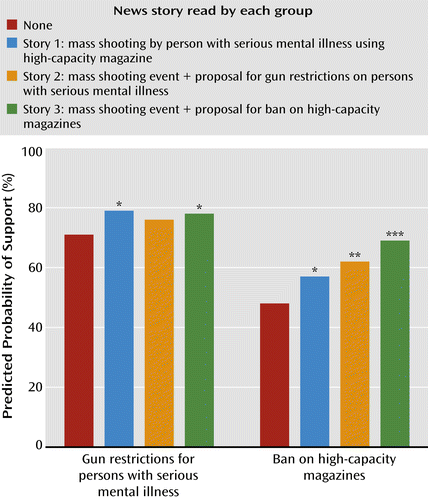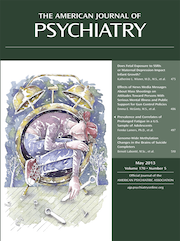In This Issue
How Reports of Shootings Affect Views of the Mentally Ill and Gun Control
A national survey showed that more than 70% of all respondents favored banning gun sales to the seriously mentally ill, whereas support for restricting high-capacity magazines varied according to news accounts read just before the survey (figure). McGinty et al. (p. Original article: 494) report that baseline support for a ban of large magazines was 48%, whereas the rate among respondents who read a fictional story of a mass shooting by a mentally ill man using a large magazine was 57%, which rose to 69% when the account also mentioned legislation proposing such a ban. In their editorial, Friedman and Michels (p. Original article: 455) discuss issues raised by recent legislative efforts to link mental illness with gun violence.

Prolonged Fatigue in Adolescents
Extended extreme fatigue with at least one associated symptom was identified in 3% of 10,123 adolescents in a representative U.S. sample. About half had the fatigue syndrome only, and about half also had a depressive or anxiety disorder. Lamers et al. (CME, p. Original article: 502) report that the rate of severe or very severe disability was nearly 60% in the adolescents with the fatigue syndrome only, but only 12% had received any health care for it. However, note Bleijenberg and Knoop in an editorial (p. Original article: 459), the natural course of chronic fatigue syndrome in adolescents is much more favorable than the course in adults.
Sexual dysfunction is common in women with schizophrenia taking antipsychotics. Lifestyle changes may help those with obesity or diabetes, as these conditions are associated with antipsychotics and can cause sexual dysfunction. Antipsychotics that raise prolactin are most related to sexual problems, and lowering the dose or changing the hour of ingestion may help. Other suggestions by Seeman (p. Original article: 471) include adding a prolactin-lowering medication and switching to a prolactin-lowering antipsychotic; aripiprazole reliably decreases prolactin, and quetiapine does in some cases. Lower prolactin may lead to pregnancy, and therefore the clinician should discuss reproductive choices with the patient.
Many patients with anorexia nervosa report that dieting helps them cope with negative affect, but once the behavior is paired with a desired outcome, it may become rewarding itself. This formulation of anorexia nervosa by Walsh (CME, p. Original article: 477) is consistent with findings that adolescent onset and shorter duration of illness are among the few factors associated with better outcome. Cognitive-behavioral therapy, interpersonal therapy, and antidepressants are ineffective, whereas interrupting the behavior and restoring normal weight are considered crucial. Younger patients often respond to family-based treatment, in which parents refeed the child to interrupt the dieting behavior. Patients with long-standing anorexia nervosa may be helped by adding habit-reversal techniques to current interventions.
Infants of women who took selective serotonin reuptake inhibitor (SSRI) antidepressants during pregnancy did not differ from infants of unmedicated healthy women in weight, length, or head circumference during the first year of life. Infants of depressed women who did not take antidepressants during pregnancy likewise showed no difference in growth. The women who took SSRIs had more preterm births than the healthy women, and their babies were shorter at birth, but Wisner et al. (p. Original article: 485) found no difference at 2 weeks or afterward. These findings are reassuring, states Parry in an editorial (p. Original article: 453), because a lack of infant growth can have long-term medical and social consequences.



